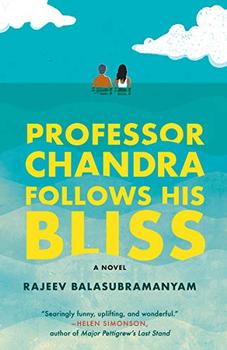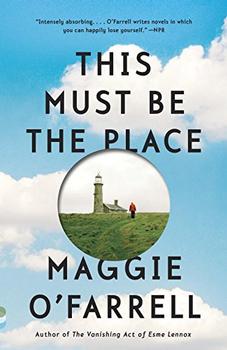Summary | Excerpt | Reviews | Beyond the book | Read-Alikes | Genres & Themes | Author Bio

Rajeev Balasubramanyam encapsulates the theme of Professor Chandra Follows his Bliss in its first chapter after Chandra learns that the thing, the one thing, he's strived for his entire life - the Nobel Prize in Economics - has been snatched from his grasp once again in what is probably his last chance to receive it. Putting on a brave face for his sympathetic colleagues is one thing. But when Jazmine, his teenage daughter, keeps asking if he's alright, this normally stoic scholar, "lost his temper and shouted, 'Can't you see I'm fine?'"
Of course he's not fine. He just doesn't know it yet. However, like some people who reach a certain age and realize they are unlikely to achieve or learn anything new, he still feels compelled to keep up the appearance of having it all together - even if he must shout at others so that he might convince himself. It is a state of being that is all too common and not unique to driven, highly motivated types.
Having spent his adult life as the esteemed provider for his family in an esteemed profession, Chandra suddenly suspects that Jazmine has "finally entered into the family tradition of torturing the patriarch." Such is the degree of his self-pity. And why shouldn't he marinate in a little whining? His former wife, Jean, is remarried and living in Colorado with retired psychiatrist Steve. His eldest daughter, Radha, refuses to speak to him or even let him know where she is. Sunny, his only son, is a kind of New Age business guru living in Hong Kong. And Jazmine, his youngest, lives with all her adolescent angst in Colorado with Jean and Steve.
In other words, Chandra is all alone without even his precious Prize to clasp to his chest. He is given to calling his students imbeciles and consoling himself with chocolate covered gummy bears and a nice glass of Greek rioja. Even though he's smug and pompous and clueless, we can't help but feel a bit sorry for him. Unlike Dickens' Scrooge, Chandra is not cruel. Nor does he see his professional goals as selfish. He tells himself it has all been for his family. Nonetheless, he is alone and underappreciated.
And unlike Dickens' Scrooge, no ghosts visit Chandra in the night with SOSs to change his ways. Not unless one counts being advised by the Department Master to take a sabbatical or getting run down by an out-of-control bicyclist and suffering a heart attack. But the message couldn't be clearer for a 21st century workaholic: appreciate what you have and enjoy your life.
So he gets himself to California on a visiting professorship and then on to Colorado where Steve irritates him to the point that he socks the man right in the kisser! It's delightful. The punch lands Steve in his infinity edge swimming pool and Chandra admits to himself that the whole experience makes him feel "giddy, alive." "It's happening, he told himself, I'm doing it. I'm following my bliss."
Little does he know it is just beginning. Threatening to tell Chandra's ex-wife that he threw a punch to the nose, Steve offers to pay for Chandra to take a course called "Being Yourself in the Summer Solstice" at California's famed Esalen Institute. (See Beyond the Book.) This turns out to be Chandra's Ghost of Years Yet to Come where he finally admits that he is human, worts and all, and that he must begin to meet his family on their terms. The ensuing - predictable - family crisis and a Colorado Christmas bring all the Chandrasekhars' hope for a more blissful future.
![]() This review was originally published in The BookBrowse Review in April 2019, and has been updated for the
March 2020 edition.
Click here to go to this issue.
This review was originally published in The BookBrowse Review in April 2019, and has been updated for the
March 2020 edition.
Click here to go to this issue.

If you liked Professor Chandra Follows His Bliss, try these:

by Maggie O'Farrell
Published 2017
A dazzling novel from bestselling writer Maggie O'Farrell, winner of the Costa Novel Award—an irresistible love story that crisscrosses continents and time zones as it captures an extraordinary marriage, and an unforgettable family, with wit, humor, and deep affection.

by Kent Haruf
Published 2016
A spare yet eloquent, bittersweet yet inspiring story of a man and a woman who, in advanced age, come together to wrestle with the events of their lives and their hopes for the imminent future.
Your guide toexceptional books
BookBrowse seeks out and recommends the best in contemporary fiction and nonfiction—books that not only engage and entertain but also deepen our understanding of ourselves and the world around us.